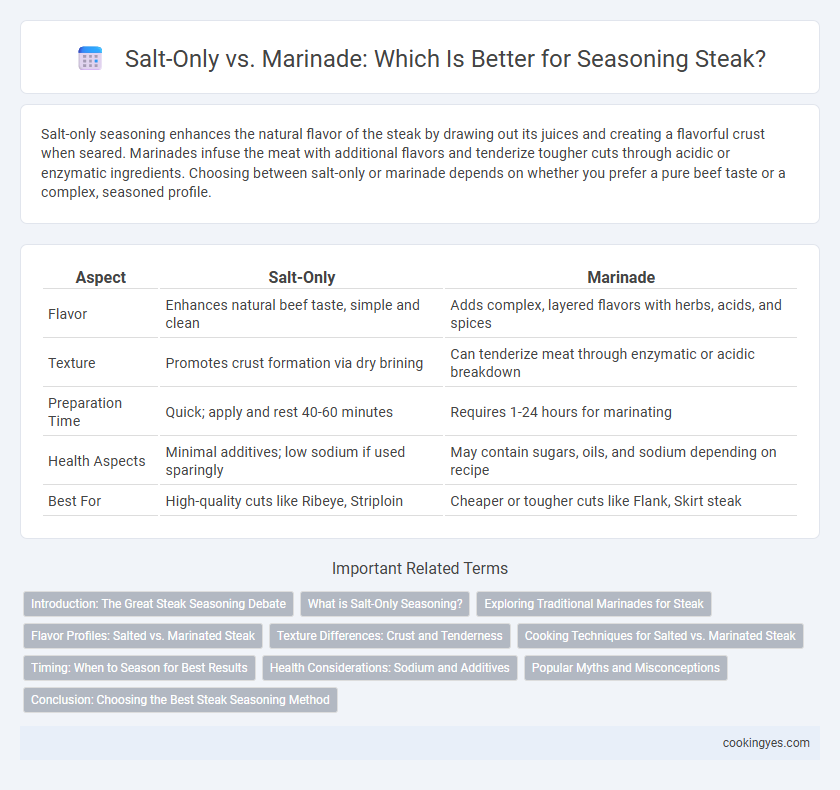Salt-only seasoning enhances the natural flavor of the steak by drawing out its juices and creating a flavorful crust when seared. Marinades infuse the meat with additional flavors and tenderize tougher cuts through acidic or enzymatic ingredients. Choosing between salt-only or marinade depends on whether you prefer a pure beef taste or a complex, seasoned profile.
Table of Comparison
| Aspect | Salt-Only | Marinade |
|---|---|---|
| Flavor | Enhances natural beef taste, simple and clean | Adds complex, layered flavors with herbs, acids, and spices |
| Texture | Promotes crust formation via dry brining | Can tenderize meat through enzymatic or acidic breakdown |
| Preparation Time | Quick; apply and rest 40-60 minutes | Requires 1-24 hours for marinating |
| Health Aspects | Minimal additives; low sodium if used sparingly | May contain sugars, oils, and sodium depending on recipe |
| Best For | High-quality cuts like Ribeye, Striploin | Cheaper or tougher cuts like Flank, Skirt steak |
Introduction: The Great Steak Seasoning Debate
Salt-only seasoning enhances the natural flavor and texture of steak by drawing out moisture and creating a caramelized crust during cooking. Marinades introduce complex flavor profiles and tenderize the meat through acidic ingredients like vinegar or citrus, but can sometimes mask the true taste of the beef. Choosing between salt-only and marinade depends on the desired balance between pure beef flavor and layered seasoning complexity.
What is Salt-Only Seasoning?
Salt-only seasoning for steak involves applying coarse kosher or sea salt directly to the meat's surface, enhancing natural flavors by drawing out moisture and creating a savory crust during cooking. This method allows the steak's inherent taste and texture to shine without introducing additional flavors from herbs or spices found in marinades. Salt-only seasoning is preferred for premium cuts like ribeye or filet mignon, where preserving the meat's pure, rich flavor is paramount.
Exploring Traditional Marinades for Steak
Traditional marinades for steak often combine acidic ingredients such as vinegar, citrus juice, or wine with herbs, spices, and oil to tenderize and infuse the meat with complex flavors. Unlike salt-only seasoning, which enhances the steak's natural taste by drawing out moisture and creating a flavorful crust, marinades penetrate deeper, breaking down muscle fibers for enhanced juiciness and tenderness. Classic marinades featuring garlic, rosemary, soy sauce, and black pepper deliver a rich, layered taste profile that complements various cuts like ribeye, sirloin, and flank steak.
Flavor Profiles: Salted vs. Marinated Steak
Salt-only seasoning enhances the steak's natural umami by drawing out moisture, creating a concentrated, savory crust that intensifies the beef's inherent flavors. Marinades, often comprising acids, herbs, and spices, introduce complex flavor layers and tenderize the meat, resulting in a more aromatic and nuanced taste profile. While salted steak emphasizes pure, robust beefiness, marinated steak offers a balanced blend of acidity and seasoning that transforms the overall flavor experience.
Texture Differences: Crust and Tenderness
Salt-only seasoning enhances steak texture by promoting a well-developed crust through moisture extraction and protein denaturation, resulting in a crisp exterior and juicy interior. Marinades, often containing acids and enzymes, break down muscle fibers to increase tenderness but can sometimes soften the crust, leading to a less pronounced sear. Choosing salt-only seasoning maximizes crust formation, while marinades prioritize tenderization, affecting the steak's surface texture and bite.
Cooking Techniques for Salted vs. Marinated Steak
Salt-only seasoning enhances the steak's natural flavors by drawing out moisture and creating a flavorful crust through the Maillard reaction during high-heat cooking. Marinades, typically composed of acids, oils, and herbs, tenderize the steak by breaking down muscle fibers and infusing it with complex flavors, requiring longer marination times for optimal results. Cooking techniques vary: salted steaks benefit from searing on a hot grill or pan to develop a crisp exterior, while marinated steaks often require gentler heat or shorter cooking times to preserve the infused moisture and prevent overcooking.
Timing: When to Season for Best Results
Seasoning steak exclusively with salt requires application at least 40 minutes before cooking to allow proper salt absorption, enhancing juiciness and flavor through protein breakdown. Marinades, rich in acids and enzymes, benefit from longer marination times, typically 4 to 24 hours, ensuring deep flavor penetration and tenderization. Timing for seasoning directly affects the steak's texture and taste, with salt-only seasoning best done well in advance and marinades requiring extended periods to maximize results.
Health Considerations: Sodium and Additives
Salt-only seasoning for steak provides a straightforward approach with controlled sodium intake, avoiding hidden additives found in many marinades. Marinades often contain additional sodium and preservatives, which may increase overall salt consumption and introduce unwanted chemicals. Selecting salt-only seasoning supports a cleaner, healthier option by minimizing excess sodium and potential additives, benefiting cardiovascular health.
Popular Myths and Misconceptions
Salt-only steak seasoning enhances natural beef flavor by drawing out moisture and creating a flavorful crust, contrary to the myth that marinades are always superior. Popular misconceptions suggest marinades penetrate deeply, but in reality, they mostly affect the surface, whereas salt improves texture and juiciness when applied correctly. Understanding the science behind salt's osmotic effect debunks the belief that complex marinades are necessary for tender, flavorful steak.
Conclusion: Choosing the Best Steak Seasoning Method
Salt-only seasoning enhances the natural beef flavor by drawing out moisture and creating a savory crust, ideal for purists seeking a straightforward taste. Marinades, often composed of acids, oils, herbs, and spices, penetrate the steak, adding complex flavors and tenderizing tougher cuts. Selecting the best steak seasoning method depends on personal preference and the steak cut, with salt-only favored for prime cuts and marinades suited for less tender varieties.
Salt-only vs Marinade for Steak Seasoning Infographic

 cookingyes.com
cookingyes.com